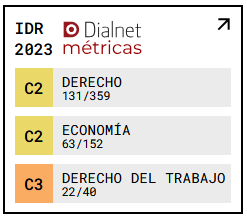Notes on a labor regulation in the economic context
DOI:
https://doi.org/10.18172/redsye.6211Keywords:
Precarious, legislative changes, decent work, crisis of the subprime and the COVID-19Abstract
The profound changes in labor legislation, mainly in western countries, result not only from corporate restructuring and the impacts of economic globalization, but also from social changes and the formation of a new social class, which perhaps comes as a substitute for the middle class that seems to be dying out. The precarious is born from the transformations resulting from the neoliberalism implemented in the 70s and from the fragment of business activity and the labor market, based on the doctrine of low cost, of consumption by consumption and social class without contours or identity. The reforms of the labor guardianships are presented as something much more profound and complex, they are located in the same context of the objectives of achieving a sustainable society, that is, in which the economic development is aimed at eliminating poverty and inequality, and creating greater opportunities for everyone to have a decent life and decent work. The pandemic of COVID-19 calls for efficient state intervention, capable of responding to the four pillars established by the ILO in the fight to achieve a base of international labor standards.
Downloads
Downloads
Published
How to Cite
Issue
Section
License

This work is licensed under a Creative Commons Attribution-NonCommercial-NoDerivatives 4.0 International License.











